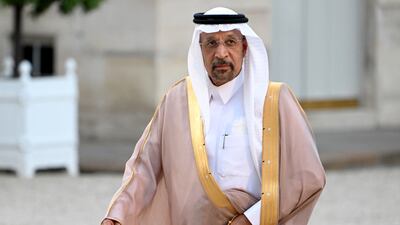Saudi Arabia is levelling the playing field for domestic and international investors and easing regulatory restrictions as the Arab world’s largest economy seeks to boost foreign investments.
The Council of Ministers on Sunday approved an updated investment law into one framework intended to provide investors with greater transparency, flexibility and confidence, Saudi Arabia's Ministry of Investment said in a statement on Sunday.
“The law reaffirms Saudi Arabia’s commitment to creating a welcoming and secure environment for investors, driving economic growth, and enhancing the kingdom’s position as a premier global investment destination,” Khalid Al Falih, Minister of Investment, said.
“The policy direction outlined in Vision 2030 allows investors to invest with certainty and to grow with confidence at a time when many other markets are experiencing considerable volatility.”
Saudi Arabia has passed reforms to improve its business environment and boost foreign investment to help drive its economic transformation agenda. The kingdom aims to attract foreign funds for its giga-projects under the Vision 2030 plan to reduce its reliance on oil.
Investment-friendly measures introduced by Saudi Arabia in recent years include the civil transactions law, private sector participation law, companies law, bankruptcy law and regulations for special economic zones.
Foreign direct investment (FDI) inflows into the kingdom stood at $19.3 billion last year, compared with $32.8 billion in 2022, according to data from the Ministry of Investment. FDI inflows jumped by 158 per cent from $7.46 billion in 2017 to $19.3 billion in 2023.
Saudi Arabia recorded a 0.6 per cent year-on-year increase in FDI inflow to 17 billion Saudi riyals ($4.5 billion) in the first quarter of 2024, according to data from the kingdom's General Authority for Statistics.
The kingdom aims to attract $100 billion annually in FDI by 2030 to boost non-oil gross domestic product and has set a goal of increasing FDI to 5.7 per cent of GDP by the end of the decade.
Saudi Arabia's updated investment law's executive regulations will come into effect at the beginning of 2025, according to a ministry statement on Sunday.
The updated law seeks to bring the rights and duties of domestic and foreign investors in line with international practices and replace foreign investor licensing requirements with a simplified registration process.
It also aims to promote “equal treatment between the domestic and foreign investors under similar circumstances” and re-evaluate the restrictions of economic activities to treat domestic and foreign investors equally.
It also seeks to attract domestic and foreign investments by granting incentives according to “specific objective and pre-announced eligibility and evaluation standards”, the ministry said.
The updated investment law also tackles the promotion of investors' rights such as the protection of intellectual property, ensures fair competition and outlines the methods of effective dispute resolution.
A service centre will provide facilities to streamline procedures related to government transactions, including assistance to streamline the flow of investments, it added.


